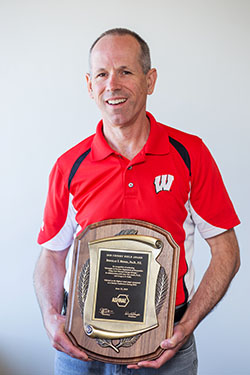 MADISON, Wis.—UW-EPD’s Professor Doug Reindl and his co-authors Professor Greg Nellis of the UW-Madison College of Engineering and Assistant Professor Amy Van Asselt of Lafayette College are the winners of the American Society of Heating, Refrigerating and Air-Conditioning Engineers’ (ASHRAE) Crosby Field Award “for the highest rated paper presented before a technical session, a symposium or a poster session, or at a Society meeting in a given year.” At the time the paper was published, Van Asselt was working as a PhD student under the supervision of Professors Reindl and Nellis.
MADISON, Wis.—UW-EPD’s Professor Doug Reindl and his co-authors Professor Greg Nellis of the UW-Madison College of Engineering and Assistant Professor Amy Van Asselt of Lafayette College are the winners of the American Society of Heating, Refrigerating and Air-Conditioning Engineers’ (ASHRAE) Crosby Field Award “for the highest rated paper presented before a technical session, a symposium or a poster session, or at a Society meeting in a given year.” At the time the paper was published, Van Asselt was working as a PhD student under the supervision of Professors Reindl and Nellis.
Their research explored how cool thermal energy storage (CTES) systems for buildings could help enable greater amounts of renewable energy to be deployed on the utility grid. The Crosby Field Award-winning paper, Strategies to Increase Deployment of Renewables Using Cool Thermal Energy Storage, identified two control strategies (Cost Control, Renewable Energy Control) to balance cooling demands within a wider energy-generation system, while contributing the following additional benefits:
- The renewable energy control strategy enabled greater utilization of electricity generated from renewable energy sources (i.e. wind, solar) by:
- Operating energy-intensive building air conditioning systems during periods where renewable energy generation was high.
- Utilizing stored thermal energy for building cooling during non-peak hours or when solar or wind energy production was low/inadequate.
- The cost control strategy maximizes operational savings by utilizing stored thermal energy to avoid electricity consumption during high-cost, on-peak periods and recharging storage during on-peak periods when energy and electricity demand costs are low.
The research evaluated both commercial office buildings and secondary schools in four distinctly different climate regions. The study concluded that a CTES system was advantageous for both the commercial office building and the secondary school.
The winner(s) of the Crosby Field Award receive a plaque and a $750 honorarium.